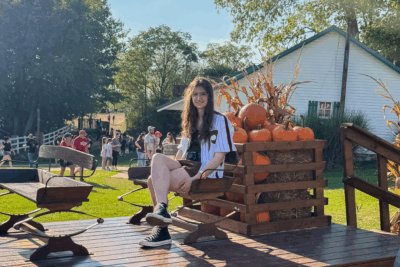Umble Center was filled on Sunday night for the presentation of the sixth annual Goshen College Monologues. Monologues is a space created for women and non-binary students and faculty of GC to share stories and experiences.
During the fall semester, women and non-binary people submitted a monologue to the steering committee, who then reviewed the stories and assigned them to cast members during the spring semester. People’s stories are shared anonymously.
This year, there were stories about identity, relationships, sexual assault, mental health, body image and friendship. Including the committee members, 25 people made up the cast.
The steering committee included seniors Hannah Friesen and Emily Stoltzfus, juniors Stephanie Dilbone, Sophia Martin and Rachael Klink and sophomore Genevieve Cowardin.
Klink said the process of planning Monologues started in September with advertising, followed by collection and editing of the monologues and then doing the cast call and preparing the Monologues performance.
This year for the first time, cast members performed movement pieces in the middle of the first and second half of the performance. The committee incorporated these movement pieces to create space for the audience to reflect and process.
Right after the sexual assault section, which was the conclusion of the first half of the performance and led into intermission, Elena Meyer Reimer, a first-year, performed an aerial silk routine.
Another addition the Monologues committee made this year was a talk-back session directly following the performance. This was done to create a space for audience members to share their thoughts, questions and reactions. Regina Shands Stoltzfus, associate professor of peace, justice and conflict studies, facilitated the discussion.
Carter McKay-Epp, an member of the audience at Sunday’s performance, said, “I was really impressed at how seamlessly everything came together to create what felt like a more coherent story, rather than isolated pieces. That was really powerful.”
Christi Sessa, a senior, was a member of the Monologues cast this year and has participated in Monologues since their first-year. “I’ve always felt honored to be a part of it,” said Sessa. “It’s really nice to be a part of sharing the stories of women and non-binary students who are a part of this campus who may not always get their voices heard.”
Sessa said that “It’s a rough thing. If you’re going to Monologues, especially if you’re a straight, cisgender, white dude, it can be really hard to hear about your role played so publicly. It’s really important to keep that in mind.”
According to Klink, one of the most challenging parts of being a leader in Monologues this year was receiving a few monologues that were controversial. “It was challenging to decide whether or not to include them, how much to include them, who it would impact,” said Klink. “We’ve been in dialogue about that since September.”
Friesen agreed that it was challenging to decide how to include certain monologues.
“The most challenging part for me this year was figuring out how to deal with the tension that arises when specific monologues don't voice themes that I agree with, especially ones that attack other's identities,” she said. “I want Monologues to be a place where people feel safe, especially those in the cast, but I also think that this is a forum for addressing some of the bigger issues on campus.”
During the talk-back session, people spoke up and named instances they felt unsafe during Monologues this year. Sessa said they have been thinking about that conversation and are left with this conclusion and question: “Monologues is supposed to cause discomfort. But who’s discomfort are we supposed to cause?”
Klink believed the talk-back session was important and effective. “There was a tension there and things that needed to be named,” she said. “Sometimes after the performance I feel heavy and sometimes I feel alone, which is not the point. Having processing space where you can name what you feel is important. People were bold in that space, and that was important too.”
“The most rewarding part for me this year was getting to see people responding to the monologues in the processing space we hosted after the performance,” Friesen said of the talk-back session.
The conversation that began on Sunday night will continue. During the talk-back session, Shands Stoltzfus stated that, “Systems of oppression love it when marginalized groups can’t talk to each other.”
She said the fact that a conversation was started shows that the students, faculty and alumni of GC are taking important steps in understanding each other’s experiences and advocating for social justice.

